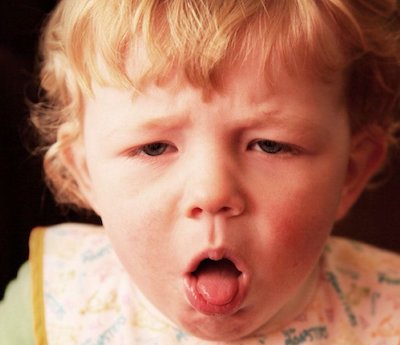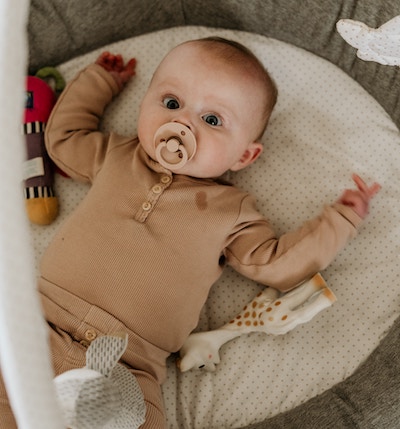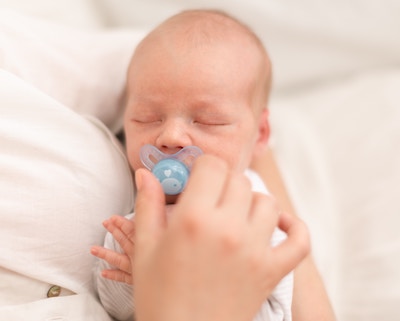
As a new parent, it’s totally normal to feel a bit concerned when you give your baby a pacifier and they suddenly start to gag. Most babies have trouble using a pacifier or certain nipple bottles at the beginning.
They make them gag, which is their body’s natural way of protecting them from swallowing something they’re not ready for.
Babies gag themselves frequently when they’re simply exploring their own hands and fingers. If you’re struggling to give your baby a pacifier, it might be simply because the pacifier is the wrong size for their tiny mouth! Double-check to make sure it’s the right fit.
Usually, over the first few months of their life, they get used to it and gag reflex gets weaker. Eventually they learn to accept pacifier, nipple or different types of food without any issues.
However, there are times when no matter what you try, your baby doesn’t keep the pacifier in their mouth and keeps gaging.
So, let’s get rid of any doubts that you, as new parents, might have about your baby’s gags.
This article is not a substitute for medical advice or consultation.
What Is Gagging?
Gagging is like a superpower reflex that we all have, and our bodies use it to prevent us from choking. And no, gagging and choking are not the same thing! When something like food touches on the back of our throat, our body automatically triggers the gag reflex.
This makes our throat muscles to contract and push the food back, so we don’t choke. It’s a natural defense mechanism that helps keep us alive!
In the first months of their life, babies have a supersensitive gag reflex that’s triggered when something comes close to the middle of their tongue. As babies grow and develop, their gag reflex becomes less sensitive. Around 7-12 months old1, the trigger point for the gag reflex moves to the back of the tongue, closer to the throat. By this time, babies are able to tolerate bigger pieces of food.
The gag reflex remains active throughout their life, so if anything like food, toy parts, or even bugs reach the back of your baby’s tongue, roof of the mouth, or throat, the gag reflex will kick in and push the object back out.

How Does Gagging Differ From Choking?
Many parents think that gagging and choking are the same thing. They’re actually very different. Choking is when the airway is obstructed with an object and the baby can’t breathe. Whereas gagging is just a reflex that prevents your baby from choking.
Some indications that your baby may be choking2 are:
- Difficulty breathing
It means that there’s an obstruction in your baby’s air passage, making it difficult or impossible for them to breathe.
- Terrified look and change of skin color
A lack of air gives the baby a frightened look, gasping for air, and a cyanotic color that is an indication they’re not getting enough oxygen.
- High pitched sounds
When your baby is struggling to breathe due to an obstruction, they may make high-pitched sounds and show signs of needing more air.
- Inability to cry
Baby’s body is focused on trying to breathe, while crying requires the need to exhale too, so choking baby may not be able to cry or make any sound.
If your baby has any of this signs and you think they’re choking, give them choking first aid by doing back blows and chest thrusts while calling 9-1-1 or local emergency services.
Also, consider joining infant CPR class – it will give you proper knowledge what to do in case your baby starts to choke.
What Can Trigger Gagging?
Babies start gagging long before they start eating solid foods, when breast or bottle feeding.
It happens to breastfed babies when they’re not properly latched and the nipple causes the babies to gag or when the baby isn’t ready to take in the milk. A baby gag reflex happens also when they need to catch their breath instead of swallowing the milk. They gag even on soft foods when they don’t like how it tastes or smells.
Babies gagging is a common thing when they first start to use the pacifier or some bottle nipples that they’re not used to. All these gags happen because the brain is trying to get used with the new things in the baby’s mouth and it’s completely normal because it is trying to protect the baby from choking.
After a few months, your baby will gag less, and it will happen only with solid foods or things that would cause gag reflexes even in adults.

Why Does My Baby Gag On Pacifier? – 7 Possible Explanations
Pacifiers can work wonders for babies, providing a calming effect, relieving pain and anxiety. Using pacifiers has been found to prevent even sudden infant death syndrome, according to a study3.
Knowing the benefits of pacifier use, and seeing the calming effects it has to other babies, makes you consider using it for your baby too. But your little one may be constantly gagging on the pacifier.
Are you wondering what exactly is causing your baby to gag on the pacifier? There are a few important causes.
1. Long Nipple Pacifier
Pacifiers come in different nipple sizes, made to match your baby’s mouth in different times as they grow. Even though the nipple size of pacifiers differs from brand to brand, there are four main nipple sizes4:
- Size 1 is meant for 0+ months
- Size 2 is meant for 6+ months
- Size 3 is meant for 18+ months
- One Size is meant for all ages
If the nipple size is not appropriate for your baby’s mouth, it will trigger the gag reflex.
2. Wrong Shape Or Texture
Pacifiers come in many shapes like round, bulb, flat, slanted. There’s a shape for every baby. If your baby doesn’t like the pacifier, try a different one to see if they’ll accept it better (you may actually need quite a lot of pacifiers for your baby, before you find the one they like, plus change them regularly as your little one grows and the paci gets worn out).
If your little one still gags on pacifier and refuses it, it may be just bothering them or your baby simply doesn’t like the binky.
3. Strong Gag Reflex
When you notice baby gagging after many attempts with different pacifiers, your baby simply doesn’t accept it, coughs and spits it, perhaps the reason is that they simply have a more sensitive gag reflex.
As the baby grows, they won’t struggle with this thing because their mouth will grow too and the gag reflex will become less sensitive.
4. Teething Or A Sore Throat
If a child is teething, their gums can become very sensitive and painful, so it may not be suitable for them to keep a pacifier in their mouth. Also, if they have a sore throat, it may not be comfortable to use a pacifier.
In cases like this, it is better to talk to their pediatrician, and they’ll let you know the true reason your baby is suddenly avoiding the pacifier.
5. Unpleasant Taste Or Smell
Sometimes your baby’s pacifier may get dirty or contaminated. Perhaps it has an odor that triggers a feeling of disgust in your baby, causing them to push it out, gag and vomit.
Make sure the paci is clean and odorless when you give it to them.
Also, replace it every 4-6 weeks for hygienic reasons5 (some experts even recommend replacing the binky every 2 weeks!).
6. Your Baby Doesn’t Want The Pacifier
Sometimes the answer is simpler than you think, your little baby may be simply not interested in sucking on a pacifier.
7. Oral Issues
If your baby has difficulty sucking on a pacifier due to a tongue-tie or oral issue, they may also have trouble pushing it out of their mouth. This can cause the pacifier to go too far back into their mouth, triggering the gag reflex.
If you think your child may have these oral issues, it would be better to consult their doctor.
Is It Normal For Babies To Gag On Pacifiers?
In most cases, when you first give your baby a pacifier, it’s pretty normal for them not to accept it or even gag on it. Remember that the baby can gag on any other object placed in their mouth, even on soft and solid food.
Try to give the pacifier to your baby calmly and not abruptly because this can also stimulate gagging.
Also, make sure the first pacifier is the smallest size possible to ensure that it doesn’t touch the back of your newborn’s mouth.
It’s a common thing in many babies, so there’s nothing to worry about unless you notice something else or have trouble breastfeeding or you feel they can’t swallow correctly because of gagging.
In such situations it is best to consult your baby’s pediatrician. They’ll examine your baby’s mouth and inform you of the reason why your baby’s gag reflex is so easily triggered.

When Should You Be Concerned About Your Baby Gagging On Pacifier
If you’ve ruled out all the factors that could cause your baby gag, such as the size of the pacifier, you’ve tried different pacifiers, the pacifier has no odor or dirt, then the best idea is to consult with a doctor.
Sometimes babies or toddlers may avoid the pacifier because they’re hungry. These are cases when you should be concerned because they may not be well fed and have no strength to hold or suck the pacifier.
If your baby has symptoms like feeding or breathing difficulties, it’s best to have them checked by a doctor. Sometimes the reason may be teething or a sore throat, which a doctor can better understand, as well as rule out any other health problems.
How Do I Stop My Baby From Gagging On The Pacifier?
At the beginning, it is best to try different sizes of pacifiers to find the one that your baby likes.
Also, the position of your baby’s neck is very important when giving a pacifier. Sometimes when your baby is lying down it’s easier for the baby gag reflex to get triggered. So, the position is also very important.
It may be helpful to give your baby different things to explore with their mouth and slowly lessen their hyper-sensitive gagging reflex.
You should let them chew on teethers, safe toys, finger food and real food and watch them develop their chewing skills. You shouldn’t be afraid that gagging will make you baby choking – as I mentioned earlier there’s a big difference between these two.

Should I Force My Baby To Take Pacifier?
You definitely shouldn’t force your baby to take pacifier. Not all babies are instant pacifier fans. Some of them won’t ever accept the pacifier and that’s okay too. It typically occurs when parents give the pacifier later and not in the first months of their baby’s life.
Sucking on a pacifier is safe and has lots of benefits, it causes fewer teeth problems than sucking on fingers. You can hide the pacifier or throw it, but you can’t hide their thumbs when they’re grown up and should let go of sucking on something.
On the other hand, prolonged pacifier use can cause difficulties with breastfeeding, affect future teeth development and increase the risk of frequent ear infections. That’s why it’s so important to wean baby off pacifier at the right time (it’s easier to do it around 6 month of age, but some experts say it’s okay if baby uses the paci up to 2 years).
Therefore pacifiers have both pros and cons for babies, but after trying several times, it is not necessary to insist on your baby to take a pacifier. There are many other effective ways to soothe and calm your baby.
The purpose of this article is informative. It’s not a substitute for professional medical advice or medical care. Remember: safety first! Consult your doctor/pediatrician in case of any doubts. The author of this article does not accept any responsibility for any liability, loss or risk, personal or otherwise, incurred as a consequence, directly or indirectly, from any information or advice contained here.
Resources:
https://www.aafp.org/
https://solidstarts.com/
https://parentswonder.com/
https://bibsworld.com/

